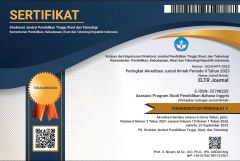VOCABULARY LEARNING STRATEGIES USED BY ENGLISH DEPARTMENT STUDENTS
Abstrak terlihat: 330 / PDF terunduh: 475DOI:
https://doi.org/10.37147/eltr.v1i1.48Keywords:
learning media, text types in English, junior high school students, text types boardAbstract
This research was done on vocabulary learning strategies (VLS) among English
Department (ED) students. The main purpose of this study was to investigate the
VLS that were mostly used by ED students. The two sub-questions were: (1)
What are the most frequent VLS used? and (2) What are the most useful VLS for
ED students? To find the answer, this study used a questionnaire adapted from
Schmitt’ s (2004) VLS taxonomy. After analyzing the questionnaires from 100
participants, it was discovered that some of the most preferred and useful VLS
were opening the dictionary and repeating the word in mind frequently.
Downloads
References
Psychology: Human Leaning and Memory, 104(2), 126-33.
Cheung, C.P. (2005). An evaluation of the treatment of vocabulary in Hong Kong secondary school English textbooks. Unpublished master’ s thesis, The
University of Hong Kong, Hong Kong.
Cheung, C.Y. (2004). The effectiveness of vocabulary learning strategies of Chinese low achievers. Unpublished master’ s thesis, The University of
Hong Kong, Hong Kong.
Chi, P. (2009). Investigating the most frequently used and most useful vocabulary language learning strategies among Chinese EFL postsecondary students in
Hong Kong. Electronic Journal of Foreign Language Teaching, 6(1), 77– 87.
Cohen, A.D. & Aphek, E. (1981). Easifying second language learning. Studies in Second Language Acquisition, 3(2), 221-236.
Creswell, J. W. (2009). Research design: Qualitative, quantitative, and mixed method approaches (3rd Ed.) Thousand Oaks, CA: Sage Publication.
Cunningsworth, A. (1995). Choosing your coursebook. Oxford: Heinemann. English as a second or foreign language. Boston, MA: Heinle & Heinle.
Fan, Y. M. (2003). Frequency of use, perceived usefulness, and actual usefulness of second language vocabulary strategies: A study of Hong Kong learners. The Modern Language Journal, 87(2), 222-241.
Ghazal, L. Learning vocabulary in EFL contexts through vocabulary learning strategies. Novitas-ROYAL, 1(2), 84-91.
Gu, Y., & Johnson, R. K. (1996). Vocabulary learning strategies and language learning outcomes. Language Learning, 46(4), 643 – 679.
Lau, M.Y. (2004). Improving the depth of vocabulary knowledge: Can teachers help? Unpublished master’ s thesis, The University of Hong Kong, Hong
Kong.
Lau, W.H. (2002). Instruction on vocabulary learning strategies: A stepping stone to independent learning? Unpublished master’ s thesis, The University of
Hong Kong, Hong Kong.
Lo, O.K. (2007). An investigation into the perceptions and effectiveness of various vocabulary learning strategies of Hong Kong ESL learners with low
English proficiency. Unpublished master’ s thesis, The University of Hong Kong, Hong Kong.
McCarthy (1988). Vocabulary and language teaching. NewYork: Longman McCarthy, M.J. (1990). Vocabulary. Oxford: Oxford University Press.
Mui, L.K. (2004). An investigation on the effectiveness of the use of different vocabulary teaching strategies on second language learner’ s vocabulary
acquisition. Unpublished master’ s thesis, The University of Hong Kong, Hong Kong.
Nation, P. (1980). Strategies for receptive vocabulary learning. New Zealand : Victoria University of Wellington.
Nation, P. (1990). Teaching and learning vocabulary. New York: Newbury House.
Nation, P. (2001). Learning vocabulary in another language. Cambridge: Cambridge
Ng, H.K. (2004). The relative effectiveness of studying English vocabulary in associated pairs and in L2 context. Unpublished master’ s thesis, The
University of Hong Kong, Hong Kong.
Nielsen, B. A Review of Research into Vocabulary Learning and Aquisition. O’ Malle, M.J. and Chamot, N.A. (1990). Learning strategies in second language
acquisition. Cambridge: Cambridge University Press.
O’ Malley, J., Chamot, A., Stewner-Manzares, G., Kupper, L. and Russo, R. (1985). Learning strategies used by beginning and intermediate ESL student.
Language Learning, 35(I) 21-46.
Oxford, R.L. & Scarcella, R.C. (1994). Second language vocabulary learning among adults: State of the art in vocabulary instruction. System, 22(2), 231-
43.
Paribakht, T.S & Wesche, M. (1997). Vocabulary enhancement activities and reading for meaning in second language vocabulary acquisition. In J. Coady,
and T. Huckin, (Eds.), Second Language Vocabulary Acquisition 174-200. Cambridge University Press, Cambridge.
Pressley, M. & Levin, J.R. (1978). Development constraints associated with children’ s use of the keyword method in foreign language learning. Journal
of Experimental Child Psychology, 26, 359-72.ELTR Journal, e-ISSN 2597-4718, Vol. 1, No. 3, January 2017, pp. 28-43
Pressley, M., Levin, J.R., & McCormick C.B. (1980). Young children’ s learning of foreign language vocabulary: A sentence variation of the keyword method.
Contemporary Educational Psychology, 5, 22-29.
Rubin, J. (1987). Learner strategies: Theoretical assumptions, research history and typology. In Learner Strategies and Language Learning A.Wendedand
J.Rubin (Eds). (PP.15-29). New Jersey: Prentice Hall.
Sahandri, Mohd., Kafipour, R., & Kumar, S. (2009). Vocabulary learning strategies of Iranian undergraduate EFL students and its relation to their
vocabulary size. Eurapean Journal of Social Sciences, 11(1).
Scharle, A. & Szabó, A. (2000). Learner autonomy: A guide to developing learner responsibility. Cambridge: Cambridge University Press.
Schmitt, N. (1997). Vocabulary learning strategies. In N. Schmitt & M. McCarthy (Eds.), Vocabulary: description, acquisition and pedagogy (pp.199-228).
Cambridge: Cambridge University Press.
Schmitt, N. (2000). Vocabulary in language teaching. Cambridge University Press, Cambridge.
Seal, B. D. (1991). Vocabulary learning and teaching. In M. Celci- Murcia (Ed.), Teaching
Stern, H. (1992). Issues and options in language teaching. Oxford: Oxford UniversityPress.
Williams, M. and Burden, R. (1997). Psychology for language teachers: A social constructivist approach. Cambridge. Cambridge University Press.
Zarafshan, M. (2002). Effects of attitude and motivation on the use of language learning.
Downloads
Published
How to Cite
Issue
Section
License
Copyright (c) 2017 Septiana Theresiawati , Anne Indrayanti Timotius

This work is licensed under a Creative Commons Attribution-ShareAlike 4.0 International License.











 ELTR Journal,
ELTR Journal, 